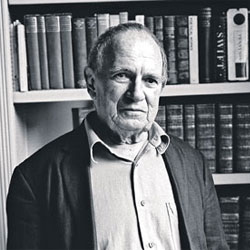Ever since men began in time, time and
Time again they met in parliaments,
Where, in due turn, letting the next man speak,
With mouthfuls of soft air they tried to stop
Themselves from ravening their talking throats;
Hoping enunciated airs would fall
With verisimilitude in different minds,
And bring some concord to those minds; only soft air
Between the hatred human animals
Monotonously bear towards themselves.
No work was more regarded in our times,
And nothing failed so often. Knowing this,
The army came to hear Achilles say:
‘Pax, Agamemnon.’ And Agamemnon’s: ‘Pax.’
Notes on the Poem
In 2002, the Griffin Poetry Prize judges praised Christopher Logue for tackling what seemed like the impossible as his literary mission. "What could be more intimidating than Homer’s great epic, the Iliad?" He was clearly up to the task, as the judges go on to laud him as he "makes it new with all the vigor and invention the old recountings could no longer carry." While Logue's source material dates back to the 8th century BC or thereabouts, there is nothing mustily ancient about his rendering of this classic work (although, controversially, Logue worked from other translations, not Homer's original work). In this excerpt from what grew (in an effort Logue commenced in 1959 and continued to 2005) to be a three-volume work, the language is crisp and contemporary, if a little elaborate at times: "Hoping enunciated airs would fall With verisimilitude in different minds, And bring some concord to those minds" The repetition of the word "time" drives home both man's propensity for, indeed, repeating history regardless of the results and also the timelessness of the tale about to be recounted. Intriguingly, gusts of "soft air" drive the reader first to the rueful observation: "No work was more regarded in our times, And nothing failed so often." ... and then to "pax", Achilles' and Agamemnon's reciprocal call (debatably genuine) for a truce. That the story of Achilles continues to fascinate to the present day - as evidenced in this application to another legendary figure - sheds light on Christopher Logue's enduring fascination and studious devotion to his own epic work.
